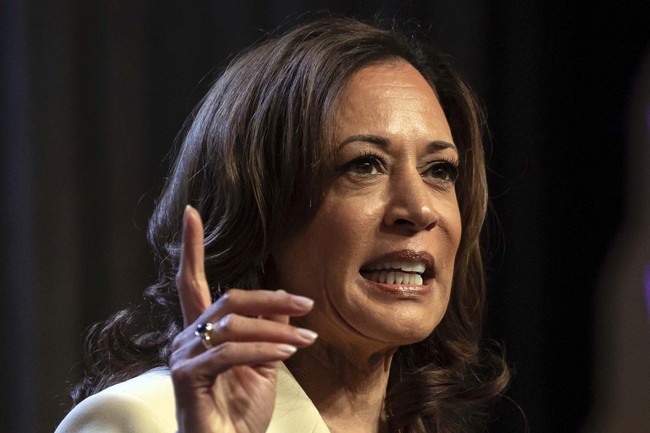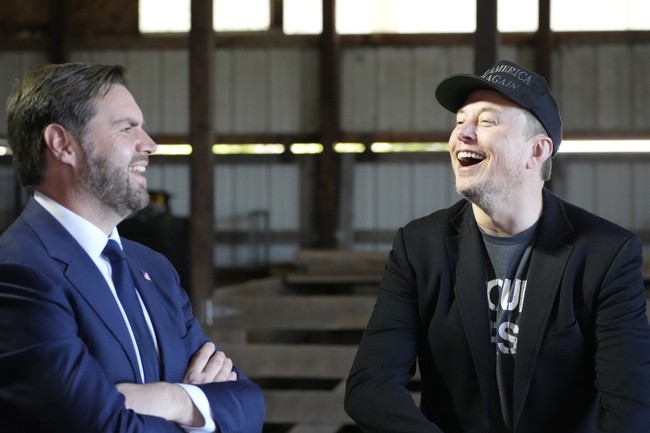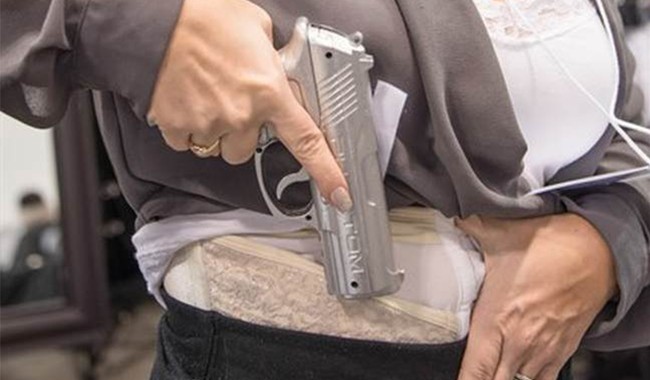
This article was originally published on Washington Times - Politics. You can read the original article HERE
It has emerged as the biggest foreign policy flashpoint of the 2024 presidential race, one that both Donald Trump and Kamala Harris have seized on to paint the other as weak, ineffective and even dangerous.
And yet, the Ukraine-Russia war also offers a window into the broader geopolitical thinking of Mr. Trump, the former president and current GOP nominee, and Ms. Harris, the Democratic White House hopeful and sitting vice president. Both want an end to the war, now approaching its third anniversary, and each has bemoaned the rising death toll in Ukraine and the global instability wrought by Russia’s invasion of Ukraine and, subsequently, the largest ground war in Europe since World War II.
Beyond sharing that broad goal, however, analysts say their positions quickly diverge and break down.
Ms. Harris is an outspoken advocate of President Biden’s push for more U.S. military and financial aid to Ukraine, and she argues that Republicans who want to slash aid — or prematurely pressure Kyiv to the negotiating table with Russian President Vladimir Putin — are only laying the groundwork for an emboldened Kremlin that could decide to push further into Europe.
But, so far at least, Ms. Harris isn’t offering any radical new ideas or bold proposals to facilitate an end to the conflict. She told “60 Minutes” recently that she would reject any one-on-one conversations with Mr. Putin, insisting that Ukraine must be represented in any such conversations, while Russian forces still occupy nearly a fifth of Ukraine’s overall territory.
Mr. Trump, on the other hand, once again is embracing a nontraditional approach. He has repeatedly insisted, often over the objections of more traditionally minded hawks inside the Republican Party, that he would use his leverage as president to force Mr. Putin and Ukrainian President Volodymyr Zelenskyy into peace talks. The war, he insisted during a debate with Ms. Harris in September, would end quickly if he is elected president.
But he’s been coy about the details of any peace deal and, perhaps most crucially, about whether he would threaten to cut off all American military aid if Mr. Zelenskyy doesn’t agree to a Trump-backed proposal.
Mr. Trump also faces pressure from a wing of the GOP that wants to limit U.S. aid to Ukraine or at least attach strict conditions to it, including a firm plan to end the war. America has given Ukraine more than $61 billion in direct military aid, in addition to other financial assistance, according to a tally compiled by the Council on Foreign Relations.
Ironically, some foreign policy analysts say that a combination of the candidates’ approaches — a more deliberate, if conventionally boring approach from Ms. Harris and the outside-the-box thinking of Mr. Trump — may be the right prescription to end the war.
“Their positions reflect their overall characteristics. Trump is bold and disruptive and sometimes dismissive of reality or ethics. Harris is careful and incremental and businesslike,” said Michael O’Hanlon, senior fellow and director of research in foreign policy at the Brookings Institution.
“Frankly, we probably need a little of both sets of characteristics to break the logjam of this war,” he told The Washington Times. “If I thought Trump could actually follow through on his instincts, I’d have good things to say about his fresh thinking. But since I can’t, I’d favor Harris’s caution, hoping though that she’d be open to a big new idea or two if and when elected.”
Complex dynamics
For those who take aim at Mr. Trump’s alleged loose approach to the traditional mores of foreign policy, they received fresh ammunition recently in the form of a new book from journalist Bob Woodward. His latest work, “War,” charges that Mr. Trump has had as many as seven private, one-on-one phone calls with Mr. Putin since he left office in January 2021.
Steven Cheung, Mr. Trump’s communications director, dismissed the claims as “made-up stories.” But they’re sure to drive more accusations from Ms. Harris and other detractors that Mr. Trump is overly friendly with dictators such as Mr. Putin and might be willing to force Ukraine to cede parts of its territory to Russia as part of any peace deal.
Mr. Trump has also spoken to Mr. Zelenskyy on several occasions this year, including an in-person meeting last month when the Ukrainian leader was in the U.S. Mr. Zelenskyy also met with Ms. Harris during that trip, and he drew criticism from Republicans for visiting an ammunition factory in Pennsylvania alongside prominent state Democrats.
The Trump-Zelenskyy dynamic is complicated by the fact that Mr. Trump was impeached by the House in 2020 for what critics say was an inappropriate push for Mr. Zelenskyy’s administration to investigate the Biden family’s business dealings in Ukraine.
For his part, Mr. Trump doesn’t deny that his relationship with Mr. Putin — who personally ordered the invasion of Ukraine in February 2022 — could help facilitate an end to the conflict, which has now killed or injured nearly 1 million people, according to recent estimates.
“I want to get the war settled. I know Zelenskyy very well, and I know Putin very well. I have a good relationship. And they respect your president,” Mr. Trump said during his September debate with Ms. Harris. “That is a war that’s dying to be settled. I will get it settled before I even become president. If I win, when I’m president-elect, and what I’ll do is I’ll speak to one, I’ll speak to the other, I’ll get them together.”
A ’surrender’ plan?
Ms. Harris recently dubbed Mr. Trump’s approach to the conflict as a “surrender” plan, charging that the Republican nominee appears willing to push Ukraine into accepting a cease-fire deal that would force it to cede territory in the eastern part of the country to Russia. Russian troops have controlled swaths of Ukraine, particularly in the Donetsk region, for much of the conflict.
At their September debate, she went even further, saying that Mr. Trump would have done little to stop the Russian army from rolling through Ukraine in 2022.
“If Donald Trump were president, Putin would be sitting in Kyiv right now. And understand what that would mean. Because Putin’s agenda is not just about Ukraine,” she said. “Understand why the European allies and our NATO allies are so thankful that you are no longer president and that we understand the importance of the greatest military alliance the world has ever known, which is NATO. And what we have done to preserve the ability of Zelenskyy and the Ukrainians to fight for their Independence. Otherwise, Putin would be sitting in Kyiv with his eyes on the rest of Europe.”
Ms. Harris and her boss, Mr. Biden, have faced intense criticism for seemingly slow-walking the delivery of military capabilities such as long-range artillery, tanks, fighter jets, and other assets to Ukraine. The administration is facing pressure both at home and from Kyiv to allow the Ukrainian military to shoot deep into Russia with U.S.-provided weapons. The White House has been reluctant to allow such a move and has limited Ukraine to only conducting defensive strikes against targets on Russian soil to prevent imminent attacks on Ukraine.
Despite those restrictions, in some corners of the battlefield, Ukraine has made stunning gains of late. Its military push into Russia’s Kursk region earlier this year has reshaped the dynamics of the war by proving that Ukraine, despite being dramatically outmanned and outgunned by the much larger Russian army, is able to capture and hold Russian territory.
That new dynamic, some specialists say, is key. Ramping up U.S. assistance now could allow Ukraine to make even more gains, perhaps giving the next American president — whomever that may be — more leverage to push for a deal with terms much more favorable to Kyiv.
“I think they can be in a better position over the next, say, six months. It depends a lot on us,” said William B. Taylor, former U.S. ambassador to Ukraine and now the U.S. Institute of Peace’s vice president for Europe and Russia affairs.
“If we continue to provide them the stuff they need, the ammunition, the authority to use these missiles … they can do better,” Mr. Taylor told The Times’ “Threat Status Podcast” recently. “That’s what has to happen.”
This article was originally published by Washington Times - Politics. We only curate news from sources that align with the core values of our intended conservative audience. If you like the news you read here we encourage you to utilize the original sources for even more great news and opinions you can trust!











Comments